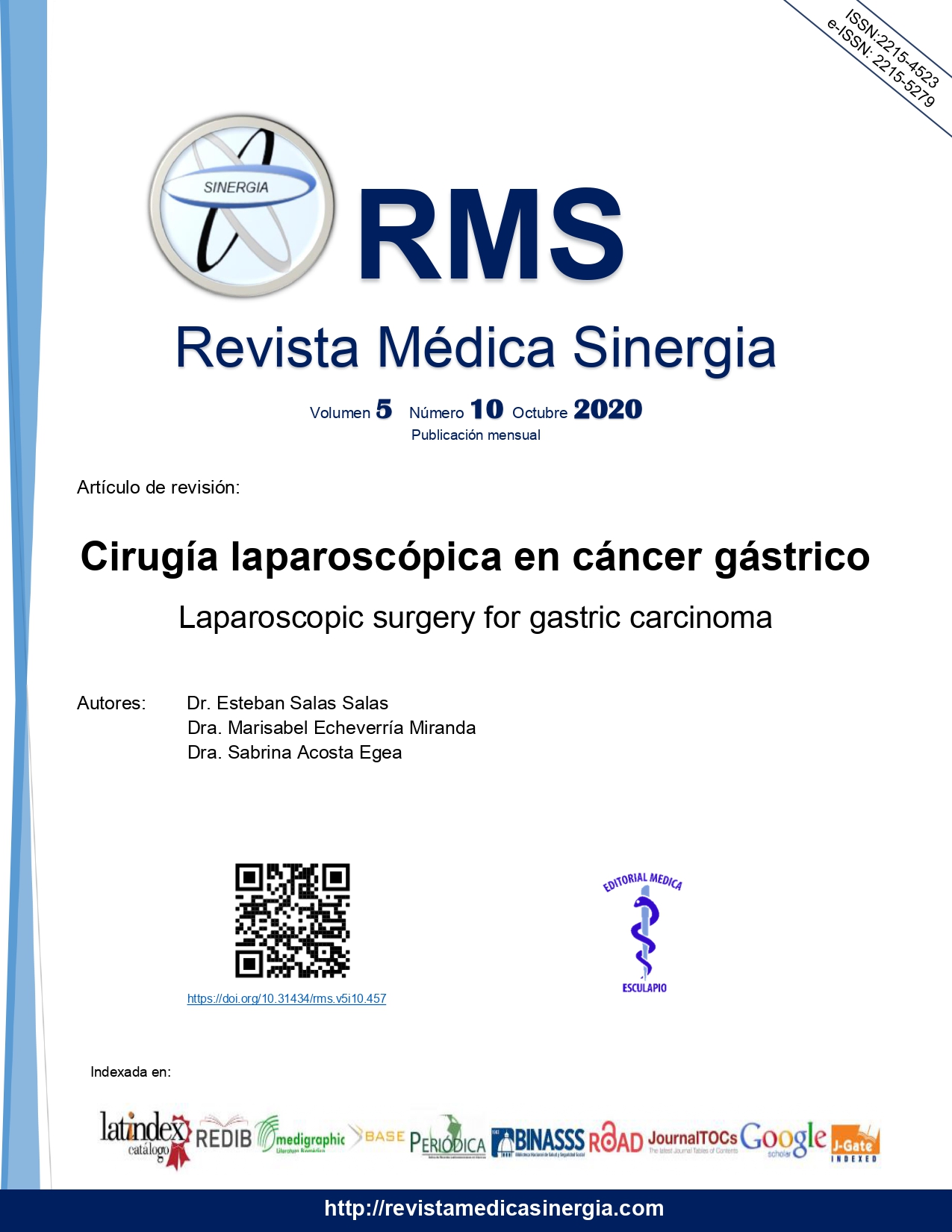Resumen
El cáncer gástrico es la segunda causa de muerte relacionada con cáncer y la cuarta neoplasia más frecuente a nivel mundial. Múltiples estudios, principalmente Asiáticos, han validado la seguridad y los resultados oncológicos a corto y largo plazo de la gastrectomía laparoscópica. Las indicaciones para este procedimiento se encuentran limitadas al cáncer gástrico temprano y al localmente avanzado, teniendo en cuenta que la disección linfática D2 presenta mucha dificultad técnica. Múltiples factores impactan el resultado de este procedimiento: propios del cirujano, del procedimiento y del paciente. Se le atribuye mayor satisfacción y mejor calidad de vida en los pacientes.
Palabras clave
Citas
Van Cutsem E, Sagaert X, Topal B, Haustermans K, Prenen H. Gastric cancer. Lancet. 2016;388(10060):2654-2664. https://doi.org/10.1016/S0140-6736(16)30354-3
Kim W, Kim H, Han S, Kim M, Hyung W, Ryu S et al. Decreased Morbidity of Laparoscopic Distal Gastrectomy Compared With Open Distal Gastrectomy for Stage I Gastric Cancer. Ann. Surg. 2016;263(1):28-35. https://doi.org/10.1097/SLA.0000000000001346
Kodera Y. The current state of stomach cancer surgery in the world. Japanese Journal of Clinical Oncology. 2016;46(11):1062-1071.https://doi.org/10.1093/jjco/hyw117
Jeong O, Ryu S, Choi W, Piao Z, Park Y. Risk Factors and Learning Curve Associated with Postoperative Morbidity of Laparoscopic Total Gastrectomy for Gastric Carcinoma. Annals of Surgical Oncology. 2014;21(9):2994-3001.https://doi.org/10.1245/s10434-014-3666-x
Katai H, Mizusawa J, Katayama H, Morita S, Yamada T, Bando E et al. Randomized phase III trial of laparoscopy-assisted versus open distal gastrectomy with nodal dissection for clinical stage IA/IB gastric cancer (JCOG0912). Am. J. Clin. Oncol. 2019;37(15_suppl):4020-4020.https://doi.org/10.1200/JCO.2019.37.15_suppl.4020
Japanese gastric cancer treatment guidelines 2018 (5th edition). Gastric Cancer. 2020.
Honda M, Hiki N, Kinoshita T, et al. Long-term Outcomes of Laparoscopic Versus Open Surgery for Clinical Stage I Gastric Cancer: The LOC-1 Study. Ann Surg 2016; 264:214. https://doi.org/10.1097/SLA.0000000000001654
Kim W, Kim HH, Han SU, et al. Decreased Morbidity of Laparoscopic Distal Gastrectomy Compared With Open Distal Gastrectomy for Stage I Gastric Cancer: Short-term Outcomes From a Multicenter Randomized Controlled Trial (KLASS-01). Ann Surg 2016; 263:28.https://doi.org/10.1097/SLA.0000000000001346
Hyung WJ, Yang HK, Han SU, et al. A feasibility study of laparoscopic total gastrectomy for clinical stage I gastric cancer: a prospective multi-center phase II clinical trial, KLASS 03. Gastric Cancer 2019; 22:214.https://doi.org/10.1007/s10120-018-0864-4
Hu Y, Huang C, Sun Y, et al. Morbidity and Mortality of Laparoscopic Versus Open D2 Distal Gastrectomy for Advanced Gastric Cancer: A Randomized Controlled Trial. J Clin Oncol 2016; 34:1350.https://doi.org/10.1200/JCO.2015.63.7215
Yu J, Huang C, Sun Y, et al. Effect of Laparoscopic vs Open Distal Gastrectomy on 3-Year Disease-Free Survival in Patients With Locally Advanced Gastric Cancer: The CLASS-01 Randomized Clinical Trial. JAMA 2019; 321:1983.https://doi.org/10.1001/jama.2019.5359
Inaki N, Etoh T, Ohyama T, et al. A Multi-institutional, Prospective, Phase II Feasibility Study of Laparoscopy- Assisted Distal Gastrectomy with D2 Lymph Node Dissection for Locally Advanced Gastric Cancer (JLSSG0901). World J Surg 2015; 39:2734.https://doi.org/10.1007/s00268-015-3160-z
Hur H, Lee HY, Lee HJ, et al. Efficacy of laparoscopic subtotal gastrectomy with D2 lymphadenectomy for locally advanced gastric cancer: the protocol of the KLASS-02 multicenter randomized controlled clinical trial. BMC Cancer 2015; 15:355.https://doi.org/10.1186/s12885-015-1365-z
Moon JS, Park MS, Kim JH, et al. Lessons learned from a comparative analysis of surgical outcomes of and learning curves for laparoscopy-assisted distal gastrectomy. J Gastric Cancer 2015; 15:29.https://doi.org/10.5230/jgc.2015.15.1.29
Son SY, Jung DH, Lee CM, et al. Laparoscopic gastrectomy versus open gastrectomy for gastric cancer in patients with body mass index of 30 kg/m2 or more. Surg Endosc 2015; 29:2126.
https://doi.org/10.1007/s00464-014-3953-4
Nguyen N, Scott-Conner C, Strong V. The SAGES Manual Volume 2 Advanced Laparoscopy and Endoscopy. 3rd ed. New York, NY: Springer New York; 2012.https://doi.org/10.1007/978-1-4614-2347-8
Mutter, D, Nedelcu, A. EMC - Gastrectomías por cáncer: principios generales diagnósticos y terapéuticos. Técnicas quirúrgicas aparato digestivo. 32nd ed. pp.1-18. Elsevier; 2016. https://doi.org/10.1016/S1282-9129(16)79452-9
Dumont F, Thibaudeau E. Gastrectomía por cáncer. EMC Técnicas Quirúrgicas - Aparato Digestivo. 34 ed, 1-23. Elsevier; 2018.https://doi.org/10.1016/S1282-9129(18)89912-3
Comparison of surgical outcomes among different methods of esophagojejunostomy in laparoscopic total gastrectomy for clinical stage I proximal gastric cancer: results of a single arm multicenter phase II clinical trial in Korea, KLASS 03
Li HZ, Chen JX, Zheng Y, Zhu XN. Laparoscopic-assisted versus open radical gastrectomy for resectable gastric cancer: Systematic review, meta-analysis, and trial sequential analysis of randomized controlled trials. J Surg Oncol 2016; 113:756. https://doi.org/10.1002/jso.24243
Hendriksen B, Brooks A, Hollenbeak C, Taylor M, Reed M, Soybel D. The Impact of Minimally Invasive Gastrectomy on Survival in the USA. Journal of Gastrointestinal Surgery. 2019. https://doi.org/10.1007/s11605-019-04263-4

Esta obra está bajo una licencia internacional Creative Commons Atribución-NoComercial 4.0.
Derechos de autor 2020 Array


